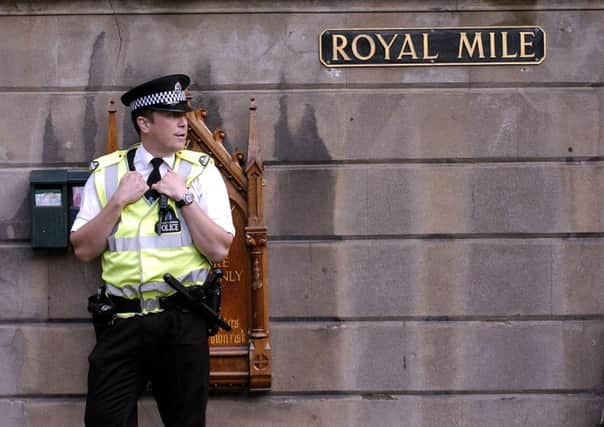Brian Wilson: Here's how to avoid political interference in the police


The critical point from which all else flows is that the creation of Police Scotland, the removal of local accountability and the appointment of a supine quango were primarily politically driven acts, rather than responses to operational needs.
In the recent words of Colin McKerracher, former Chief Constable of Grampian: “The police didn’t want it. The public had no great appetite for it. So why did it happen? It happened because the SNP Government wanted to brand it ‘Scottish’.”
Advertisement
Hide AdAdvertisement
Hide AdThat omnipresent imperative continues to trump all other considerations for those who view our society through the narrowest of political prisms. Creating nationwide bodies with the suffix “Scotland” attached, just in case anyone was in doubt, has symbolised the drive for political control over every cog in the wheel of national life.
Policing in Scotland formerly rested on a tripod of regional police boards with democratic accountability; Ministerial responsibility at a safe distance from operational matters; and Chief Constables answerable to the Boards for running their forces. By and large, the system worked. Dissatisfaction with the organisational structure of Scottish policing did not rate high on many agendas.
There were operational matters on which closer co-ordination was required, though experienced police officers believe this could have been achieved without creating a single force, particularly when the trade-off extracted was loss of local nuance and accountability, to be replaced by an anonymous Scottish Police Authority (SPA) made up of the usual quango trusties.
My objections (shared only by the Liberal Democrats at Holyrood) were threefold – loss of local accountability as part of the wider pattern of centralisation; the creation of yet another quango as an erosion of local democracy and, crucially, the proximity of Scottish Government ministers to operational policing. In particular, the office of a single Chief Constable would inevitably become more politically charged.
One of many questions which now arise is how many senior officers, with the necessary qualifications, would want the Police Scotland job, in the certain knowledge that they would be walking into a vipers’ nest of political intrigue and constant external attention, as well as the normal demands of policing the country. That legacy will not be resolved with a short-term fix.
Throw in damage to morale, a rush to the retirement exit of experienced officers and the damage done to the public credibility of Scottish policing, and it is clear that the political architects of Police Scotland face a long charge-sheet. Surely it is time for some admission of responsibility and at least partial reversal of the structural damage, instead of ploughing on in the hope that another new appointment will do the trick?
The SPA has been invisible in its supposed role, to “promote continual improvement in policing” and “hold the Chief Constable to account”. On the one known occasion when it sought to exercise its independence, by recommending reinstatement of Chief Constable Phil Gormley, it was promptly put back in its box by the Justice Secretary. This administration does not create quangos for the purpose of losing control.
The new chair of the SPA, Susan Deacon, said this week that she “prefers to look forward and not back” and that she “doesn’t want people playing the blame game” about what has gone before, which are understandable clichés given the history of the organisation. At the same time she complained about scrutiny by MSPs of the Justice Secretary’s involvement in the Gormley case on the grounds that it was “unedifying”.
Advertisement
Hide AdAdvertisement
Hide AdThat is where a contradiction arises. A few years ago, MSPs would not have been asking these questions because no Minister would have been interfering in the work of Police Boards across Scotland. It is the political action of establishing Police Scotland and the SPA quango which has created conditions in which political scrutiny of their relationships is the wholly justified corollary and it is naïve to protest otherwise.
Deacon’s problem is that she is presiding over an organisation which has no real right to exist in its current form and has so far done nothing to earn public confidence. That is not her fault but she will not circumvent history or politics by telling those who attempt to scrutinise the whole murky business to back off because efforts to get to the truth of why Scotland’s Chief Constables fall like ninepins are “unedifying”.
Perhaps I can offer her a different approach to sending out the message that the SPA has become independent of government, rather than patsies who are remunerated to rubber-stamp and defend a very bad idea. First, she should listen to people like McKerracher who is calling for the restoration of a degree of local accountability in the structure of Scottish policing.
Instead of resisting that approach, it would be refreshing if the SPA took the lead in advocating it; presumably the organisation is not unaware of the perceptions which surround it. Quangos don’t vote for their own dissolution so I am realistic in my expectations. A division of functions between a national organisation and a small number of regional bodies with elected representation would be both feasible and reassuring.
Then there is the interesting question of British Transport Police and the Nationalists’ drive to break it up in order to make the Scottish element part of Police Scotland. Nobody but nobody with any sense thinks this is a good idea. The Chief Inspector of Constabulary has confirmed that it has no policing rationale and is driven purely by politics. Real issues of public safety are at stake. The envisaged costs of “integration” are escalating into millions which could be used for actual policing.
What better opportunity for a new broom at the SPA to say: “For the next few years, Police Scotland has enough on its plate. We cannot support the break-up of British Transport Police.” That would be interesting but also, I fear, unlikely.